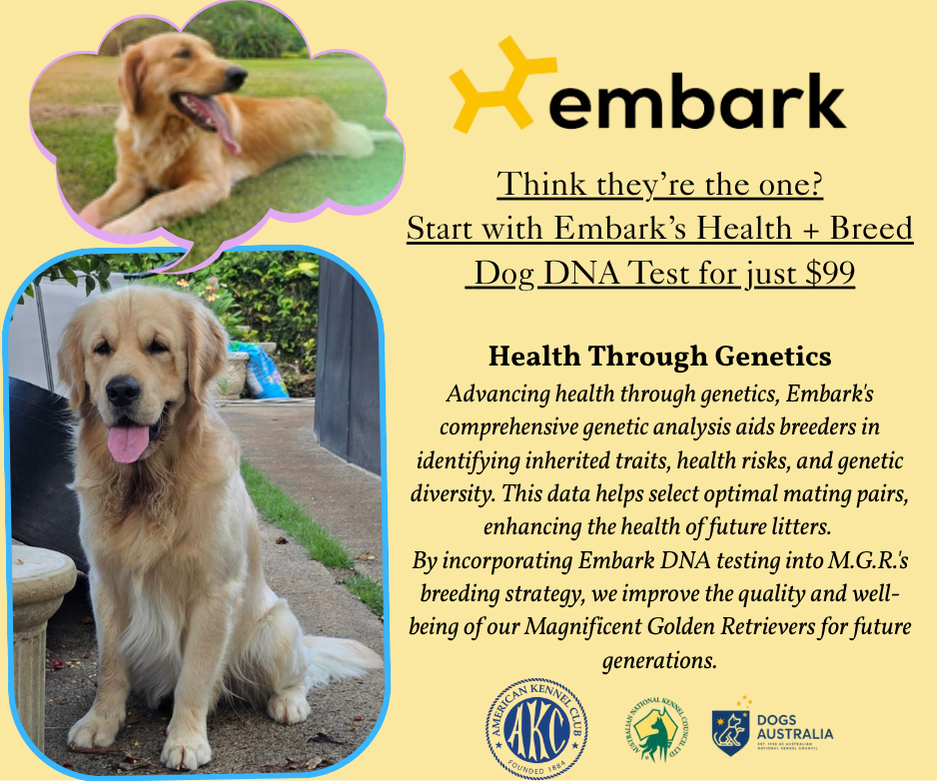A Pup’s Nutrition
Our goal is steady, lean growth—not rapid weight gain. Feed for a body condition score (BCS) of 4–5/9: ribs easy to feel under a thin fat layer, clear waist from above, slight abdominal tuck from the side. Recheck weekly and adjust portions up/down 10–15% as needed.
On this page
- Daily Calorie Targets (by weight)
- Meals per Day
- Kibble & Healthy Toppers
- How to Calculate Calories (RER method)
- Body-Condition Checks & Portion Adjustments
- Sample Daily Menus
- Important Notes for Large-Breed Puppies
Daily Calorie Targets (by weight)
Use weight-based targets and then fine-tune by BCS. For large-breed puppies like Golden Retrievers, aim for the lower end of the range to keep growth lean.
8 wks–4 months old (≈ 2.0–3.0× RER range; start near 2.0× for Goldens)
| Weight | RER (kcal) | Daily kcal (low→high) |
|---|---|---|
| 5 kg / 11 lb | 234 | 470 → 700 |
| 7.5 kg / 17 lb | 317 | 635 → 955 |
| 10 kg / 22 lb | 394 | 790 → 1,180 |
| 12 kg / 26 lb | 451 | 900 → 1,350 |
| 15 kg / 33 lb | 534 | 1,070 → 1,600 |
4–12 months old (≈ 1.6–2.0× RER range; start near 1.6× for Goldens)
| Weight | RER (kcal) | Daily kcal (low→high) |
|---|---|---|
| 10 kg / 22 lb | 394 | 630 → 790 |
| 12 kg / 26 lb | 451 | 720 → 900 |
| 15 kg / 33 lb | 534 | 855 → 1,070 |
| 20 kg / 44 lb | 662 | 1,060 → 1,325 |
| 25 kg / 55 lb | 783 | 1,250 → 1,565 |
| 30 kg / 66 lb | 897 | 1,440 → 1,795 |
Adults (≥ 12 months)
Typical maintenance is ~1.4–1.8× RER (neutered/low activity on the low end; intact/very active on the high end). Many pet Goldens maintain well around 1,250–1,600 kcal/day; working/very active adults may need 1,800–2,200+ kcal/day.
Meals per Day
- 8–12 weeks: 3–4 meals/day
- 3–6 months: 3 meals/day → transition to 2
- ≥ 6 months: 2 meals/day
Use scheduled meals (no free-feeding). You may moisten kibble with warm water during heavy teething if needed.
Kibble & Healthy Toppers
Feed a complete and balanced large-breed puppy formula. Add measured fresh toppers for variety and palatability.
- Lean proteins: plain cooked chicken, turkey, beef, or fish (boneless/skinless)
- Vegetables: lightly steamed broccoli, carrots, cauliflower, green beans (no seasoning)
- Beef gelatin powder: small amounts mixed with warm water over meals (see samples below)
- Probiotic: per label directions
Topper limit: keep toppers ≤ 20% of total daily calories unless you’re using a complete, balanced home-prepared recipe designed for growth.
How to Calculate Calories (RER method)
RER (kcal/day) = 70 × (body weight in kg0.75). Then multiply by a life-stage factor:
- < 4 months: ~2.0–3.0 × RER (use the low end for Goldens)
- 4–12 months: ~1.6–2.0 × RER (start near 1.6×)
- Adults: ~1.4–1.8 × RER
Convert pounds to kilograms: kg = lb ÷ 2.2
Body-Condition Checks & Portion Adjustments
- Recheck BCS weekly in puppies, monthly in adults. Adjust portions ±10–15% based on rib feel, waistline, and energy.
- Overfeeding increases orthopedic risk; underfeeding stunts growth. Target lean, steady development.
- Always provide clean drinking water; carbon-block filtration is a good option.
Sample Daily Menus
Note: kibble calories vary (often ~340–450 kcal/cup). Check your bag’s kcal/cup and adjust.
8–12 weeks (3–4 meals; start ~2.0× RER)
- Kibble: portion to hit your daily kcal target (divide into 3–4 meals).
- Per meal topper: 1–2 tbsp lightly steamed veggies + 0.5–1 oz plain cooked lean protein.
- Beef gelatin: ~½ tsp per meal mixed with warm water and poured over.
3–6 months (3 meals → transition to 2; ~1.6–2.0× RER)
- Keep toppers within ≤20% of daily calories.
- Probiotic per label directions.
6–12 months (2 meals; ~1.6× RER is a good starting point)
- Maintain lean condition; adjust portions promptly if ribs become hard to feel or if the waist disappears.
Adults (2 meals)
- Start near ~1.4–1.6× RER for typical pet activity; increase for working/very active dogs.
Important Notes
- Use diets that meet growth (including large size) with appropriate calcium and Ca:P—do not add calcium on your own.
- Avoid high-calorie treats and unmeasured table scraps.
- Avoid onions, garlic, xylitol, cooked bones, alcohol, and excess salt.
Disclaimer: This page is educational and not individualized medical advice. Consult your veterinarian for specific recommendations.

